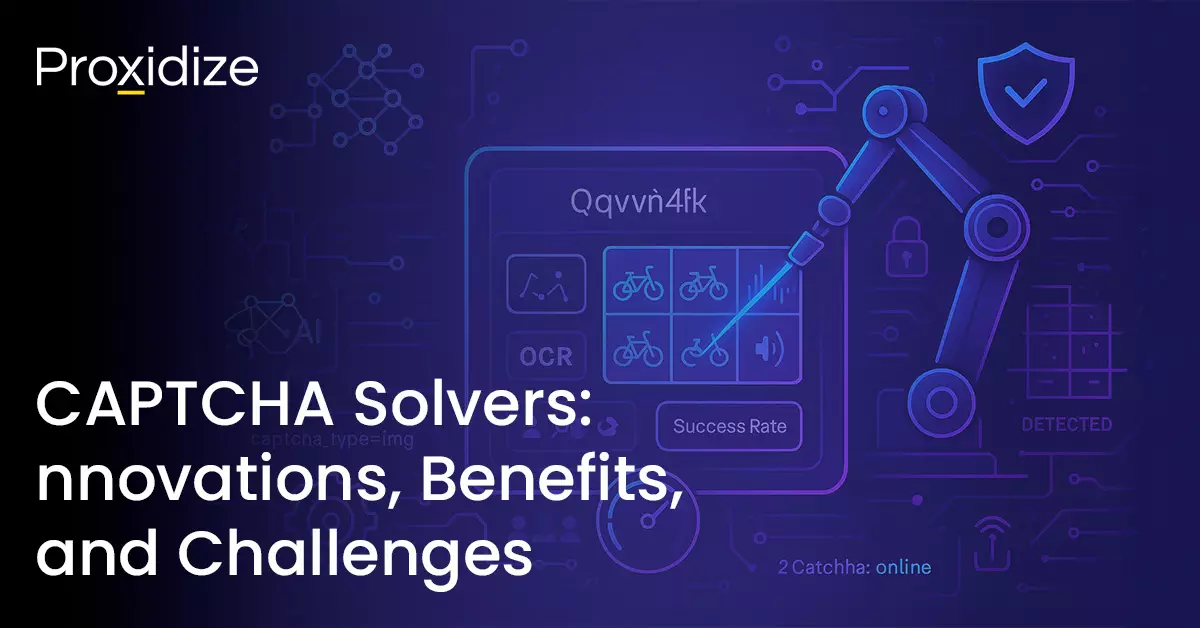Captcha is a widely adopted security measure designed to distinguish between human users and automated bots. captcha are integral in preventing bots from engaging in activities such as spamming, hacking, and unauthorized access, thereby maintaining the integrity and security of websites.
Despite their importance, captchas also present challenges for legitimate users, including accessibility issues and interruptions to smooth user experience. This is where captcha solvers come in. They are innovative tools developed to overcome these challenges by automating the captcha-solving process. These solvers not only enhance automation for legitimate purposes but also drive advancements in artificial intelligence and machine learning.
This article delves into the world of captcha solvers, exploring how they’ve evolved, their types, and the benefits they bring to various individuals. From web scrapers and accessibility advocates to businesses and researchers, captcha solvers play a crucial role in navigating the digital landscape. We will uncover the mechanisms behind captcha technologies, the ongoing battle between security and automation, and the challenges captcha-solving technologies face.
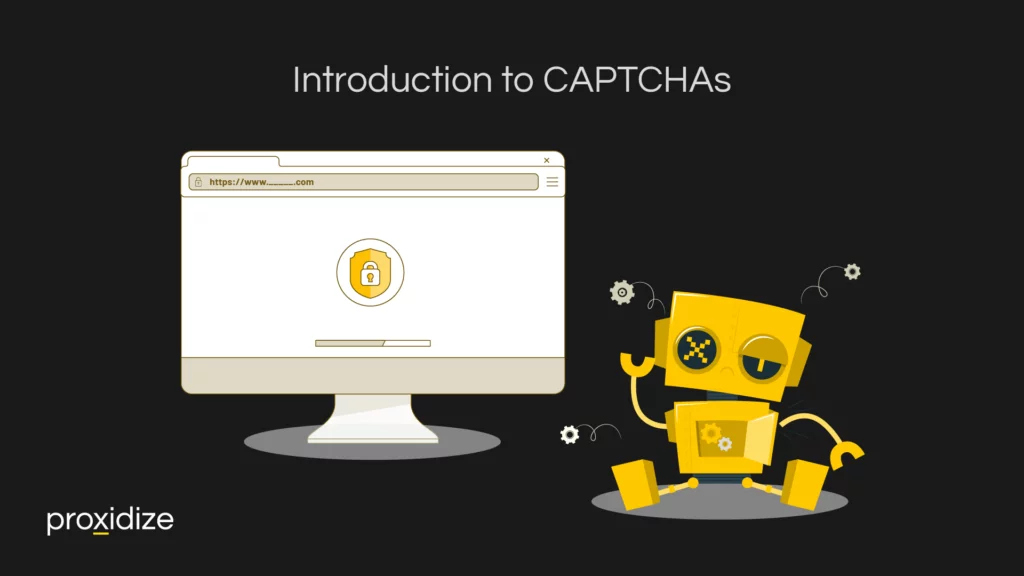
Introduction to Captcha
Captcha, which stands for “Completely Automated Public Turing Test to Tell Computers and Humans Apart”, is a security measure used to differentiate between human users and automated bots. The purpose of captcha mainly concerns websites preventing bots from engaging in malicious activities such as spamming or hacking. captcha acts as a wall to prevent bots from making it to the posting stages of websites or from accessing the website’s sensitive information. They safeguard websites from automated attacks where bots try numerous website combinations to gain unauthorized access. By filtering out bots, CAPTCHAs help maintain the quality of user-generated content, thereby enhancing the overall user experience.
A completely anonymous profile starts
with the highest quality mobile proxies
The value of websites implementing captchas cannot be understated. They are a cost-effective security measure requiring minimal human intervention. They reduce the need for manual moderation and intervention and save time and resources for website administrators. captcha technology is constantly evolving to fight against bots which makes them paramount for websites trying to reduce or eradicate bot activity such as through Google’s reCAPTCHA v2 which advanced from single text recognition to image-based challenges and even behavior analysis. By understanding the purpose and importance of captcha, it becomes clear how essential this tool is in maintaining the security and integrity of online interactions.
How Captcha Works: Mechanisms and Technologies
There are many forms of captcha, each with its purpose and layer of security. We will briefly cover these now:
- Text captchas: The earliest form of captcha, this type presents itself as a series of distorted characters with a mix of capital and lowercase letters that are often difficult to classify. A user must accurately type in the characters to proceed.
- Image captcha: This mechanism requires users to identify specific objects within a set of images such as selecting all the pictures containing buses or street signs. This plays onto the human ability to recognize captcha images which most bots are typically unable to.
- Audio captchas: Similar to the text-based, some captchas employ an audio file with distorted background noise, making it clear enough for any human user to hear but often difficult for a bot without speech recognition software enabled. This proves itself useful to those with a visual impairment.
- Advanced technologies: Modern captchas, such as reCAPTCHA v3 employ behavior analysis rather than direct challenges. This method analyzes how users interact with a website to determine their likelihood of being human. However, this method does require website administrators to configure thresholds for blocking suspicious activity.
Despite their effectiveness, captchas are not foolproof. Sophisticated bots and captcha-solving services continue to evolve, presenting ongoing challenges to captcha developers. Regardless, captchas remain a critical tool in web security, balancing user experience with protection against automated threats.
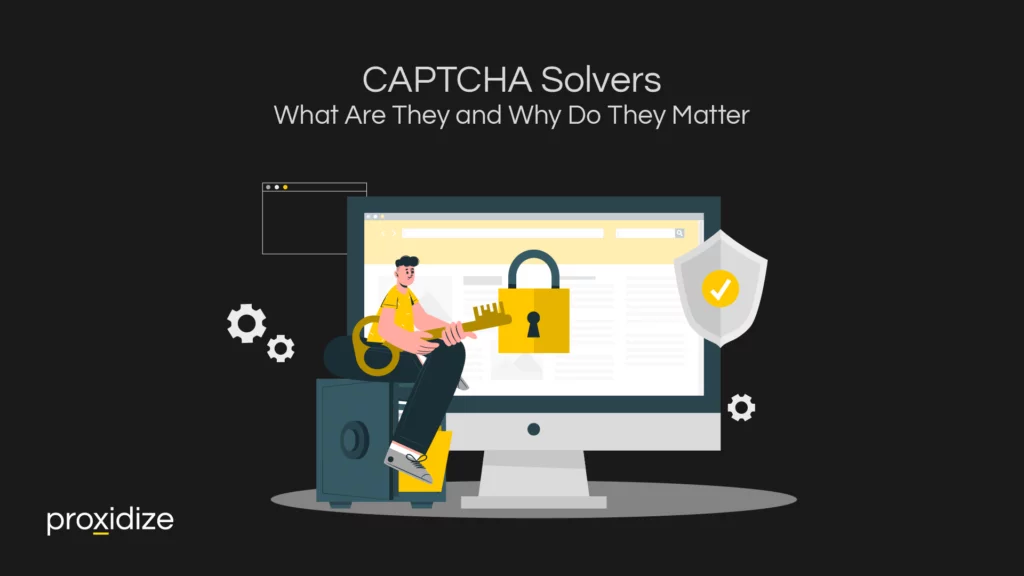
What is a Captcha Solver?
A captcha solver is a service that automatically solves captchas for you. Captcha solvers come in two forms: automated technologies and human-powered services. Automated captcha solvers use machine learning and optical character recognition (OCR) to decode captcha images and audio challenges. Human-powered services involve real people manually solving the challenges. Platforms like 2Captcha employ human workers to provide quick solutions to captcha puzzles, ensuring the user can automate their processes without worrying about the captcha roadblock.
Captcha solvers such as CapSolver have created advancements in AI and machine learning, developing algorithms capable of solving complex challenges. These advancements have pushed researchers to improve image recognition services, natural language processing, and pattern recognition techniques. The continuous evolution of captcha solvers forces the development of more robust and secure systems. This ensures that captcha technologies are constantly improved upon, making them more effective at distinguishing between humans and bots. While this may seem negative for bot users who pose no malicious intent, it will create stronger security against those who might.
The competition between captcha solvers and developers has led to innovations in accessibility. As the challenges become more sophisticated, developers are increasingly focused on creating solutions that are not only secure but also accessible to all users. For example, audio captchas and user behavioral analysis techniques have been developed to provide alternative ways for legitimate users to prove their humanity without facing difficulties. For users who are visually impaired, having an audio captcha is more helpful than attempting to decipher the jumbled words or captcha images.
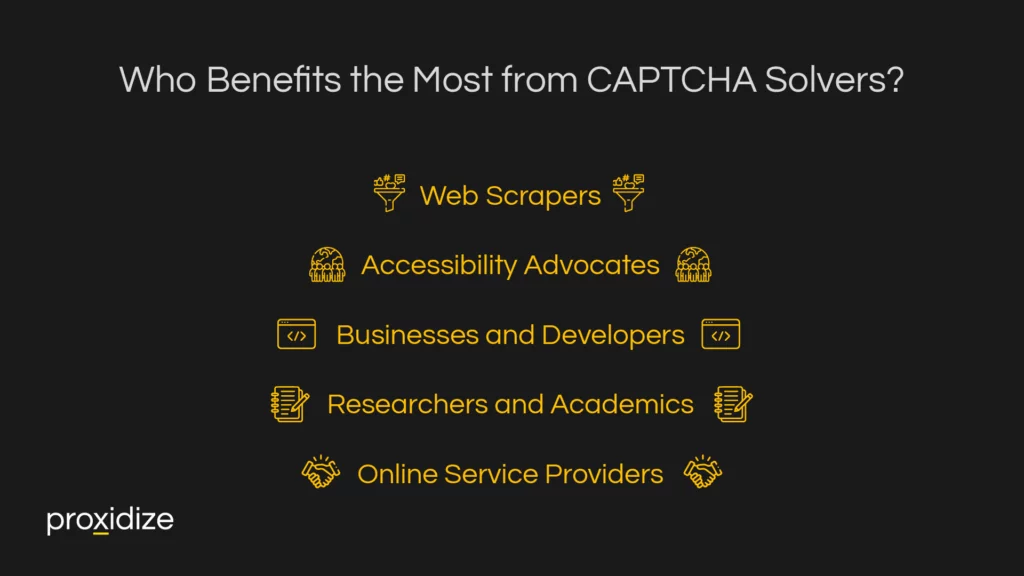
Who Benefits the Most from Captcha Solvers?
Captcha solvers are beneficial for a multitude of users including web scrapers, accessibility advocates, businesses and developers, researchers and academics, and online service providers. While they may seem malicious in their intent, captcha solvers have many positive aspects to them that can assist users in simplifying their online interactions and evolving AI and machine learning modules.
- Web Scrapers: As mentioned previously, captcha solvers are essential for web scrapers that automate their process. Many websites implement captchas during account creation which would stop a scraping bot from moving forward. Using a solver would eliminate the issue and cause the bot to scrape without anything blocking its path.
- Accessibility Advocates: For individuals with disabilities, captchas can be a significant barrier to accessing online content. Solvers can help these users navigate websites more easily, ensuring they have equal access to digital resources and services.
- Businesses and Developers: Companies developing AI and machine learning models use captcha solvers to train their systems. These solvers help improve the accuracy of AI algorithms by providing diverse and challenging datasets. Developers creating bots for automated customer support or data entry benefit from the ability to bypass captcha efficiently.
- Researchers and Academics: Solvers provide valuable insights for cybersecurity research and the development of more sophisticated security measures. By studying how the solvers work and their limitations, researchers can design better and more secure captcha systems that are harder for bots to break.
- Online Service Providers: Certain online services require frequent form submissions or account creation processes that benefit from captcha solvers. These services can streamline their operations and reduce the issues caused by captchas, thus enhancing user experience and increasing user retention rates.
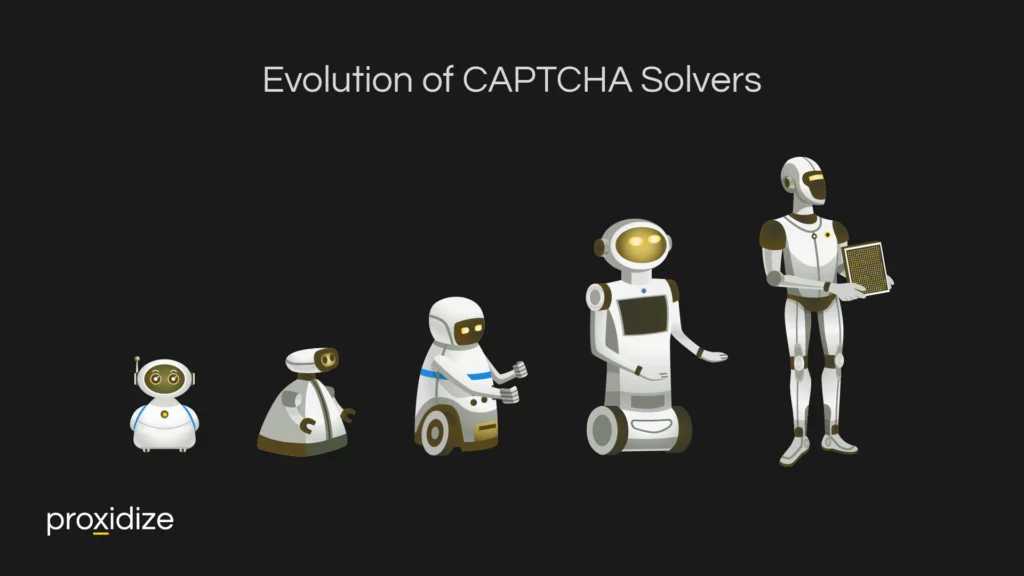
Evolution of Captcha Solvers
Initially, captcha tests were simple and effective in distinguishing humans from bots. However, as technology advanced, so did the methods for bypassing these tests, leading to the development of increasingly sophisticated captcha solvers.
In the early days, captcha tests primarily involved text-based challenges that presented distorted characters for users to interpret. These were effective against simple bots that couldn’t process complex images or text manipulations. However, as bots became more advanced, they started to incorporate capabilities such as JavaScript execution and image recognition, which allowed them to bypass these simple text-based captchas.
The next significant leap in the evolution of captcha solvers came with the advent of machine learning and AI. AI-powered solvers began to emerge, utilizing deep learning techniques to analyze and solve CAPTCHA challenges with high accuracy. For instance, machine learning models like deep convolutional neural networks, or CNNs, have been trained to achieve success rates of up to 99.8% in solving reCAPTCHA challenges.
Today, the landscape of captcha solvers includes specialized services that offer captcha-solving as a service. These services leverage large datasets and sophisticated algorithms to solve various captcha challenges, from simple text and image recognition tasks to more complex reCAPTCHA systems.
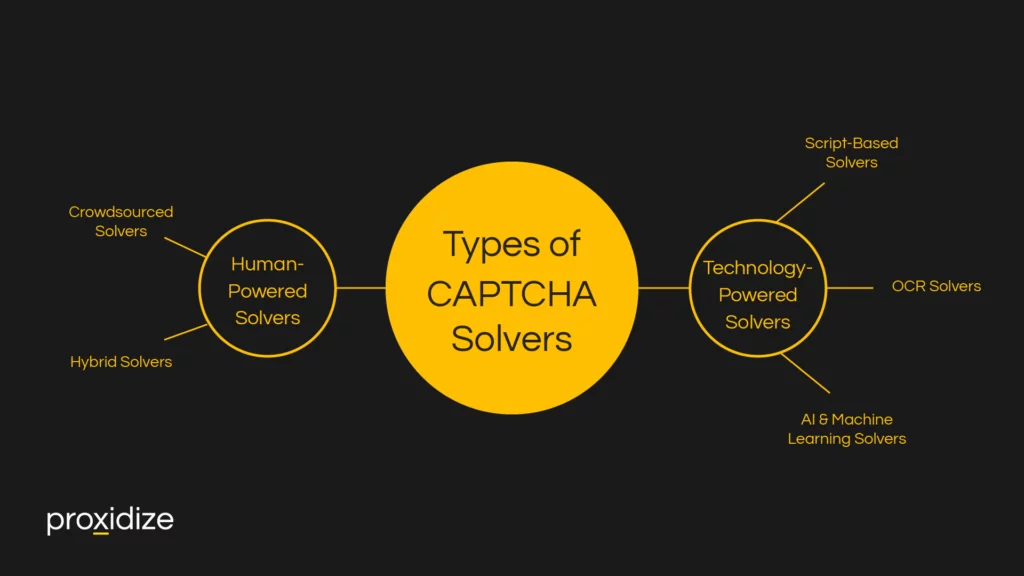
Types of Captcha Solvers
These solvers can be broadly categorized into two types: technology-powered solvers and human-powered solvers.
Technology-Powered Solvers
- Optical Character Recognition (OCR) Solvers: These solvers use OCR technology to identify and decode text-based captchas. Advanced versions employ machine learning algorithms to improve accuracy and handle more complex captcha designs.
- AI and Machine Learning Solvers: Modern solvers such as CapSolver utilize AI models trained on vast datasets of captcha images. These models can solve a wide range of captcha types, including reCAPTCHA with high accuracy and speed. AI-powered solvers offer near-instant solutions, making them highly efficient for automated processes.
- Script-Based Solvers: These tools use predefined scripts to tackle various captcha types. These scripts can be customized and updated to adapt to new captcha formats. These solvers can automatically forward unsolved captchas to external services if needed.
Human-Powered Solvers
- Crowdsourced Solvers: Platforms like 2Captcha connect to a network of human solvers who manually solve captchas in real time. This approach ensures high accuracy, especially for complex captchas that are difficult for automated systems to decode. The solutions are then fed back into automation workflows.
- Hybrid Solvers: Some services combine OCR and AI technologies with human solvers to enhance accuracy and reduce response times. This hybrid approach ensures that even the most challenging captchas are solved efficiently.
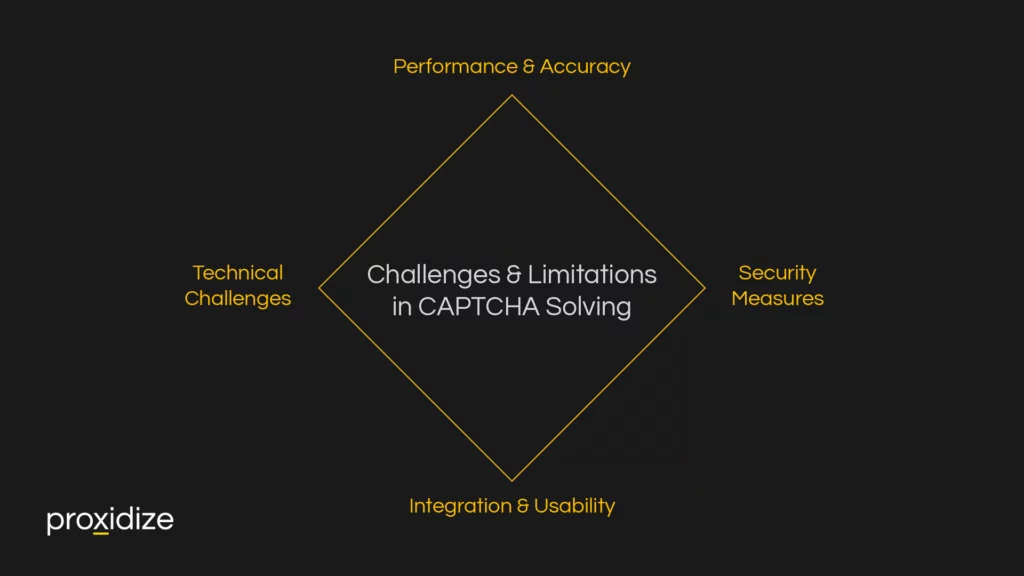
Challenges and Limitations in Captcha Solving
While captcha solvers offer innovative solutions for automating various tasks, they also encounter significant challenges and limitations.
- Technical Challenges: One of the primary challenges is the diversity and complexity of captcha types. Solvers must handle text-based captchas, image recognition tasks, and even audio captchas. Each type requires different solving techniques, from OCR for text to advanced machine learning models for image and audio analysis. These technical requirements demand continuous updates and improvements for the solvers to keep up with evolving captcha designs.
- Security Measures: Captcha systems are continually updated to bypass automated solvers. Developers of captcha solvers must stay ahead of these updates, which often include more complex challenges and better detection of automated attempts.
- Performance and Accuracy: Despite advancements, captcha solvers do not always achieve 100% accuracy. Complex captchas can still pose significant challenges, leading to failed attempts. This limitation affects the reliability of these tools, especially in critical applications where accuracy is paramount. Continuous improvements in AI and machine learning are necessary to enhance performance.
- Integration and Usability: Integrating captcha solvers into existing systems can be complex and requires careful consideration of usability. Developers must ensure that these solvers do not introduce vulnerabilities into their systems and that they operate efficiently without degrading user experience or system performance.
While captcha solvers provide valuable uses in web automation, they must navigate a landscape of technical challenges. Continuous innovation and responsible use are key to maximizing their benefits while mitigating potential downsides.
Conclusion
Captcha solvers have become an essential tool in navigating the complexities of modern web security. They offer significant benefits to various individuals, from web scrapers and businesses to accessibility advocates and researchers. By evolving from simple scripts to advanced AI models, captcha solvers have pushed the boundaries of automation and artificial intelligence. However, the constant advancements in captcha technologies pose ongoing challenges, ensuring that the development of captcha solvers remains a dynamic and innovative field. As we move forward, the balance between usability and security will be crucial in shaping the future of captcha-solving technologies.
